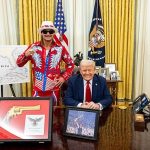Protests against Elon Musk and his role in the Trump administration’s Department of Government Efficiency (DOGE) have swept across the nation, with demonstrators targeting Tesla dealerships to express their frustration. These protests, dubbed the “Tesla Takedown,” have gained traction in major cities, including Washington, D.C., Chicago, and San Francisco, as activists voice concerns over Musk’s influence on federal policy and his push for government downsizing. While many protests have remained peaceful, the movement reflects growing discontent with Musk’s leadership and its impact on vital programs like Social Security.
The protests are driven by fears that Musk’s DOGE initiative is undermining essential government services. Critics claim that his aggressive cost-cutting measures—such as reducing federal workforce numbers and closing local offices—have disrupted operations at agencies like the Social Security Administration (SSA). Reports of website outages and overwhelmed call centers have left vulnerable populations struggling to access their benefits. Activists argue that these changes are part of a broader effort to privatize Social Security, a move they see as detrimental to millions of Americans who rely on the program for financial stability.
Congressman Jake Auchincloss (D-MA) has been outspoken in condemning Musk’s actions, particularly his claims that deceased individuals are fraudulently receiving Social Security payments. Auchincloss refuted these allegations as baseless and accused Musk of using them as a pretext to push privatization efforts. He warned that Democrats would fiercely resist any attempts to dismantle Social Security, emphasizing its importance as a cornerstone of America’s social safety net. Auchincloss also criticized Musk for intertwining his business interests with political agendas, arguing that such actions invite scrutiny and dissent.
The protests have also highlighted broader concerns about the intersection of corporate power and politics. Musk’s estimated $340 billion fortune is largely tied to Tesla, making the company a focal point for activists aiming to challenge his influence. Demonstrators have called for boycotts of Tesla vehicles and stock divestment, hoping to weaken Musk’s financial base. While some protesters have resorted to inflammatory rhetoric, including Nazi imagery, most participants stress the importance of peaceful demonstrations to amplify their message without resorting to violence or vandalism.
As debates over DOGE policies continue, the protests underscore the tension between innovation and governance. Musk’s supporters argue that his reforms are necessary to eliminate waste and inefficiency in government, while opponents contend that they disproportionately harm vulnerable communities. The movement against Musk reflects broader dissatisfaction with the direction of federal policy under Trump’s administration, raising questions about accountability, transparency, and the role of influential figures in shaping public policy. With protests showing no signs of slowing down, the battle over Social Security and government efficiency remains a defining issue in American politics.




